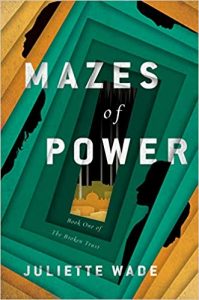Katharine Coldiron Reviews Mazes of Power by Juliette Wade
 Mazes of Power, Juliette Wade (DAW 978-0-75641-574-7, $26.00, 416pp, hc) February 2020.
Mazes of Power, Juliette Wade (DAW 978-0-75641-574-7, $26.00, 416pp, hc) February 2020.
As a reviewer, I recognized pretty early on that Mazes of Power by Juliette Wade was not a perfect book. The characters can’t stop saying each other’s names; the emotions are way overclocked; the worldbuilding is good but somewhat ostentatious, with characters invoking their gods and goddesses and other ways of life much more often than was realistic. Yet, as a reader, I couldn’t stop turning pages. I wanted badly to know what would happen in the schemes and political maneuverings that form the plot of this first novel in a series – whether our hero would get the girl in the end, who would ascend the throne, who would be assassinated. The book’s obvious weaknesses barely detract from the extraordinary tension and momentum that Juliette Wade has built into it.
Mazes of Power contains seven castes, 12 ruling families, 10 deities, and a slew of speaking characters. It’s a complex world, but the story is as old as humanity: the struggle for power by a greedy few. Our hero, Tagaret, is the son of a monster and the brother of another. His father, Garr, is a sneaky, grasping, sadistic man, while his brother, Nekantor, is twisted with both ambition and genuine mental illness. Tagaret, uninterested in advancement for himself, wants to unite with his star-crossed love, Della, and hamper his brother’s efforts to seize the position of Heir, second in line to being Eminence of Varin. That’s the main story, which is structured by several rounds of competition among young men seeking to be Heir, shored up by a deadly illness sweeping the noble caste, and complemented with a love story in the servant caste. Other threads include Tagaret’s affair with his best friend, his shifting relationship with a powerful, feminist cousin, and various scandals and friendships that rise and fall across the length of the book.
This book is skillfully imbued with microtension, a kind of mental itching powder that makes the reader devour one page after another in order to see what happens next. Tune this magical force correctly, and a reader will follow you anywhere; add too much or too little, and the reader will skip ahead to the end or put down the book entirely. Wade pitches microtension with restraint and control, which makes Mazes of Power compulsively readable. It’s also a genre novel with the heart of an opera: emotions are huge and all-important, and villains and heroes both move to the edges of their respective spectra. Garr is almost cartoonishly evil, abusive and obstinate, while Tagaret’s mother is nearly angelic in her love, beauty, and self-sacrifice. Nekantor is as power-obsessed as Garr, and much more unstable, but his obsessive compulsions make him pitiable: “He touched the buttons on his vest, top middle, bottom. He straightened his cuffs, looked back to the watch. Tick, tick… better, better. He would not scream. He would stay in the game.”
Turning the volume up on characters, situations, and emotions risks deafening the reader. This problem manifests in Mazes of Power in a surprising way: consequences often don’t exist. Tagaret and his friends speak frequently about the risks they run of getting in trouble with their parents or other authority figures when they break rules, but this trouble never seems to appear, despite copious rule-breaking. A sequence in which Tagaret must sneak into a house and pretend to steal something of great value goes exactly as planned, with no excess suffering and no wrong turns. Characters sometimes make mistakes in this novel, but everything works out pretty smoothly; villains succeed only as far as they’re meant to in order to set up more conflict, and heroes get most of what they want, as far as they can in such a rigorously stratified society.
Despite these constant false alarms, somewhat breathless dialogue, and a surfeit of characters, Mazes of Power has many virtues. It introduces an unusual universe (the cities in Varin are a series of underground caves) and a society entailing endless storytelling possibilities. Wade characterizes and builds plot with competence, and her sex scenes are as pleasing as those in romance novels. Although it’s a debut, it doesn’t just introduce the characters and move them around, but it hints at something larger yet to come. As a bureaucrat explains to Tagaret: “Our duties to the Grobal Trust, and to the continuity of the Race, have nothing to do with our personal desires. I learned this, and so will you. These are the responsibilities of our exalted station.” Tagaret is angry and skeptical at these words, and no wonder. No nation which has held power in nobility over a mass of underlings has held it peacefully, and, after all, the book series is called the Broken Trust.
Ignoring its flaws, I galloped through this 400-pager, pursuing its twists and turns with impatience, hoping for more as soon as I was finished. Wade has a knack. Tune into it.
Katharine Coldiron is the author of Ceremonials (Kernpunkt Press), an SPD fiction bestseller. Her work as a book critic has appeared in The Washington Post, The Believer, The Guardian, and many other places. She lives in California and at kcoldiron.com.
This review and more like it in the February 2020 issue of Locus.
 While you are here, please take a moment to support Locus with a one-time or recurring donation. We rely on reader donations to keep the magazine and site going, and would like to keep the site paywall free, but WE NEED YOUR FINANCIAL SUPPORT to continue quality coverage of the science fiction and fantasy field.
While you are here, please take a moment to support Locus with a one-time or recurring donation. We rely on reader donations to keep the magazine and site going, and would like to keep the site paywall free, but WE NEED YOUR FINANCIAL SUPPORT to continue quality coverage of the science fiction and fantasy field.






